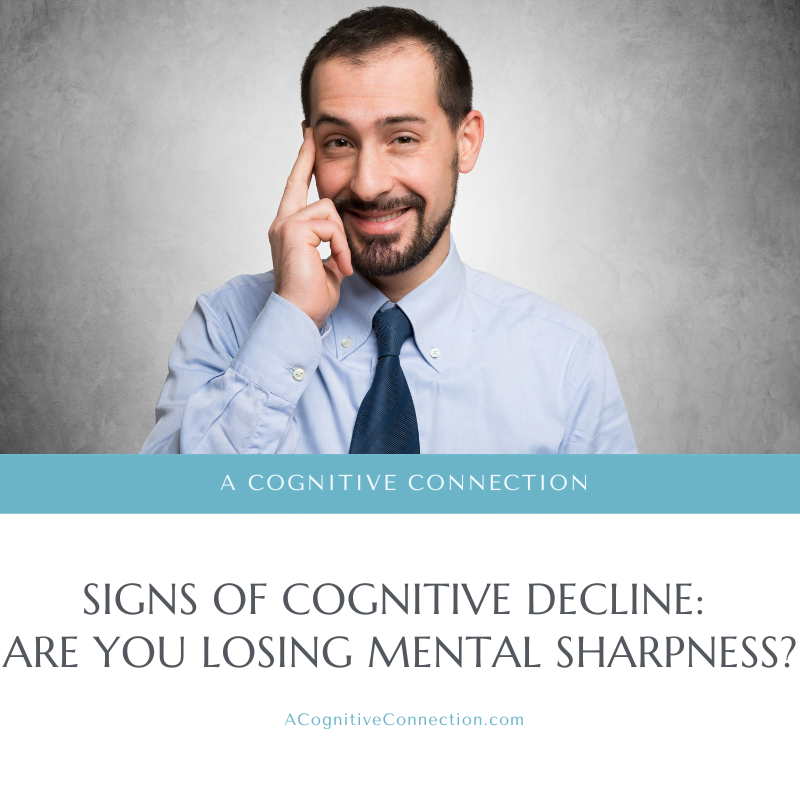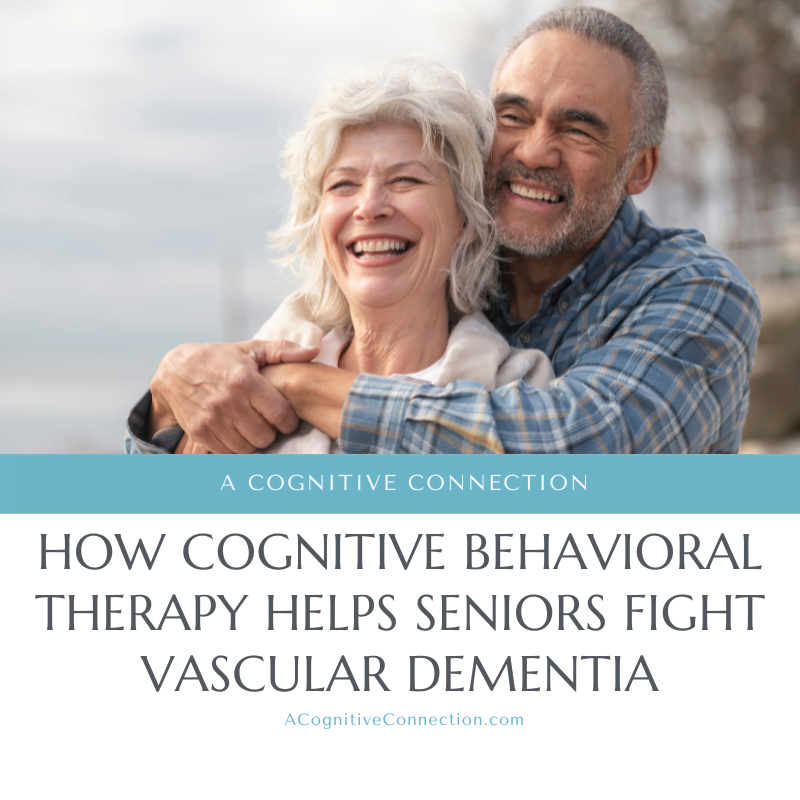
When we’re in the primes of our lives, it’s easy to feel invincible mentally and like we can take on anything the world throws at us. Unfortunately, as we age, most of us experience some symptoms of cognitive decline. This change can happen anytime, though it usually becomes more evident once we leave our 40s. That said, some people might develop symptoms sooner. In fact, some people might even experience early dementia and need real hands-on help.
Do you need to worry excessively if you feel less “with it” than usual? Not necessarily because mental sharpness can vary on a day-by-day basis. However, knowing a few warning signs is critical if you’re noticing yourself slipping and think you need help. At A Cognitive Connection, we can help you better understand your symptoms of cognitive decline and can provide hands-on support to help you get through this situation in Colorado Springs with ease.

Most People Lose Some Sharpness As They Age
Now, aging naturally slows our bodies and minds down at some level. For example, someone who previously had a can’t-miss memory might struggle slightly to remember things from time to time. That doesn’t mean there’s anything wrong with them! In fact, it’s typically pretty standard for most people to lose a bit of mental definition. That said, not everybody loses mental acuity.
Just think of your friend who’s still learning new languages, practicing new skills, and continually sharp well into their 60s and 70s. We all have at least one person in our life like that! It’s not fair to compare yourself to them if you feel slower by comparison. Some people are genetically blessed mentally, and most of us lose some sharpness later; honestly, there’s no shame in it.
Furthermore, not all cognitive losses are permanent or caused by aging. Anxiety often causes severe brain fog that can make us feel a little less “with it” than usual. Stress can also trigger cognitive decline, and thankfully, learning how to manage this problem can restore your skills more quickly than you might think. Even a few brain games might restore some sharpness!
That said, not all cognitive losses are benign or normal. Unfortunately, many people see a gradual decrease in their mental health that may linger with them for a long time, even permanently. Though self-directed cognitive brain training might help stave off some of these symptoms, others might need more long-term medical therapy to stay mentally with it.

Are Your Losses More Serious? Signs of Mild Cognitive Loss
Mild cognitive loss (MCI) is the middle-ground between average mental decline and severe dementia symptoms. Now, not everybody with MCI will develop dementia. Some simply show higher-than-usual losses in mental acuity and precision. That doesn’t mean MCI is easy to manage or untroubling! In fact, its symptoms can be pretty difficult and include:
- Forgetting Important Things: Are you forgetting things like doctor’s appointments, social events, or phone numbers more often? You might have MCI. While some brain exercises may help to keep you mentally sharp, your symptoms might stay consistent.
- Losing Your Train of Thought: Have you ever suddenly found yourself unable to continue a discussion because you lost yourself? Or is it hard to follow conversations logically? These signs might indicate early symptoms of MCI that could worsen.
- Getting Lost: Is it getting harder for you to find your way around your hometown? You might have early MCI or worse. Even though seniors can improve their memory to fight this problem, it’s all too easy to struggle with it for years if you’re not treated properly.
- Mental Health Changes: Are you feeling depression, anxiety, a short temper, or a lack of focus? Often, these (along with other symptoms) indicate early MCI development. It’s especially concerning if exercises to improve your mental focus don’t seem to help.
It’s important to note that these symptoms could worsen with time but never become true dementia. That said, many people with MCI do develop dementia or even Alzheimer’s disease, even early in life. As a result, it’s essential to pay close attention to the early warning signs of dementia and reach out to our team at A Cognitive Connection to get help immediately.

Warning Symptoms of Dementia to Watch
Now, we don’t want to alarm you by claiming that your cognitive decline could be dementia. In fact, many people experience minor changes in think that aren’t remotely connected to Alzheimer’s or other dementia-related conditions. That said, watching for these warning signs is essential to ensure you’re safe. These include changes in behavior as diverse as:
- Subtle Short-Term Memory Changes: Are you forgetting where you put things? Or do you forget why you entered a room? Everybody experiences these issues sometimes. If they’re persistent with you, there’s something serious at play with your mind.
- Struggle When Thinking of Words: Sure, we all have those moments when we can’t think of the right word. But someone with dementia will consistently struggle and might even stop in the middle of a sentence. Watch for this sign to track your development.
- Sudden Mood Changes: As dementia worsens, it’s common for people to experience mood swings. One moment, they might be as happy as can be, and the next, they’ll swing at loved ones. Depression and anxiety are widespread in the early stages.
- Apathy: Do you find yourself indifferent to the world around you? Have you lost interest in things that once fascinated you? This change could be linked to depression but may also be caused by the early development of dementia. Either way, you need help.
- Confusion: Few people are constantly on top of everything, and most need clarification sometimes. However, if you get easily confused by simple things you used to do so quickly, such as following recipes or playing games, you might have dementia.
- Other Signs to Watch: Is it hard for you to follow storylines or directions? Do you struggle to know what direction to go when traveling? Are you repeating simple tasks regularly or struggling to adapt to change? These might all indicate dementia.
Again, just because you have one or more of these symptoms, that doesn’t mean you automatically have dementia. These could all be caused by things as diverse as stress or temporary confusion. That said, if you genuinely think you might be in the early stages of dementia or want to get help checking out your risks, A Cognitive Connection is here to help.

How We Can Help You
At A Cognitive Connection, we’ve helped many Colorado Springs residents understand their cognitive decline. With our hands-on services, we can help you fight back against mental losses and restore as much as possible. While we can’t promise a miracle, we can promise to fight hard for you. If you live in El Paso County and need cognitive help, consider our care options:
- Cognitive brain training, including V.I.B.E.S. therapy to retrain your brain in many ways
- Mind’s Eye treatment that uses light and sound to ease your mind and calm your anxiety
- Personalized events that can help you meet other people who need support
- Behavioral assessments to figure out where you might be struggling the most
- Therapists who can answer all your questions to ensure you get help
- Behavior counseling to help you better handle potential cognitive losses
- Neuroptimal feedback to get a better understanding of your cognitive health
- One-on-one tutoring to help you fight back against your cognitive losses effectively
- Behavior consultation to teach you even better ways of fighting your mental losses
- Brain builder programs that can boost your thinking and keep it strong
- H.E.R.O.E.S. Program to provide you with more hands-on support for development
Our many satisfied reviews highlight how well we can help people like you get the therapy they need. With years of experience in this field, we’ve served many El Paso County residents and will do whatever we can to support you. If you live in Colorado Springs and think your mental decline needs therapy, we’ll do whatever we can to make this process easier for you to handle.
Reach Out To Our Team Today!
Do you hit some or many of these symptoms and feel like you need some help? You’re not alone, and we’re here to support you! At A Cognitive Connection, we can help you better understand your cognitive decline and track your symptoms. Once we know how severe they’ve become, we can work hand-in-hand with you to halt your loss and potentially reverse it. Our therapies are designed to provide you with the help you need to stay sharp mentally late in life.
So please don’t hesitate to contact us today to learn more about our therapies, including our H.E.R.O.E.S. program. By working with our team of caring therapists, you can improve your cognitive skills or, at the very least, keep them steady. You can call us at (719) 358-6637 or swing down to our office in downtown Colorado Springs. We help El Paso County residents like you understand their cognitive strengths and ensure that they stay mentally stronger for longer.



